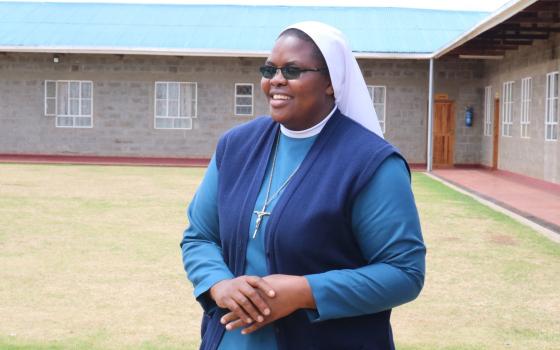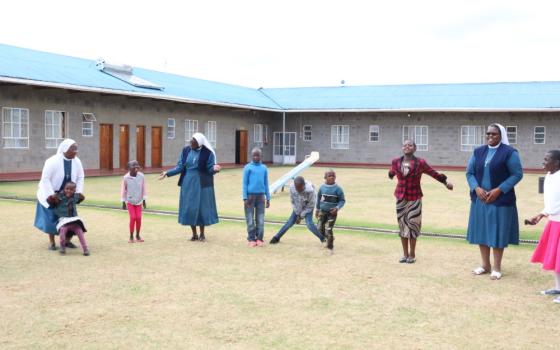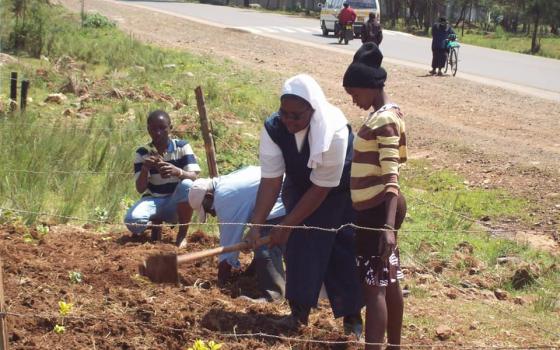Sr. Redemptor Ikonga is determined to achieve one of the United Nations' sustainable development goals by promoting, protecting and restoring terrestrial ecosystems.
Ikonga, a member of the Daughters of Mary Immaculate (Dimesse Sisters), plants an average of 10 trees every day. She and other sisters from her congregation also ensure that their first contact with local communities is no longer focused on faith alone, but on connecting people and the realities of life.
This is because these Catholic women religious have always responded to the pressing needs of society. They began to work toward the need for environmental sustainability because they say care of the environment is inherently connected to the care of the poor.
This has enabled the sisters to encounter God in creation through observing the changing of the seasons, walking the grounds of the orphanage center they run and maintaining its small garden.
Ikonga said her passion for environmental conservation and taking care of Mother Nature has been the driving force behind her efforts. Around her convent is a plantation of pine, eucalyptus, grevillea, robusta and cypress trees creating a canopy.
"I have been encouraging my colleagues [sisters] and the community on protecting and safeguarding our biodiversity," she said. "I really love what I do, and I believe conserving the environment can transform the lives of people."
The 37-year-old nun also serves the HIV-positive orphans as administrator at Talitha Kum Children's Home in Nyahururu, western Kenya.
GSR: What does Talitha Kum Children's Home deal with?
Ikonga: Talitha Kum Children's Home is a facility that supports HIV-positive orphaned children in the community of Nyandarua, Laikipia and Baringo counties. It provides a hybrid of institutional and community care for HIV-positive children who are orphaned and vulnerable. Our aim is to enhance community participation in institutional care and support where the community actively participates by volunteering their resources.
Why do you think it's important that the environment is conserved?
For me, the environment is my whole being since it concerns all living and nonliving things that occur naturally. It takes a big percentage of my holistic life: physical, spiritual, moral, psychological, etc. Each and every day, I depend on the environment for my existence.
What motivates you toward conserving environment?
Genesis 1:31: "And God saw that all he had made was good." This motivates me to keep my environment clean, treasuring all the natural resources available and also encouraging the people around me to do the same. Keeping the environment clean is also one of our achievements where we have tried to channel our litter into the right disposal point. This is through provision of dustbins and educating the children on the importance of cleanliness.
What have you achieved in your pursuit to conserve the environment?
So far, from my passion for planting trees and ornamental plants, the physical appearance of Talitha Kum Children's Home has improved. During the inception of the project, I tried involving as many people as possible. I mobilized people from tree nurseries, who gave various trees generously. Other well-wishers could buy the trees and donate to us while still others could offer manpower by coming and doing the planting. Visiting school students also participated in the project.
From the outcome of this project, there is a high demand from groups and especially weddings who come and hire our home for photo sessions and receptions. Church groups come for video shooting for their song productions.
The young children in the home have come to like and own the project. They are interested to the point of taking initiative of watering the plants, and even when coming home from school, they come with some plants to plant them at the home.
Tell us about the challenges you have encountered.
Sometimes, we plant trees and other plants, and after some time due to harsh weather, some dry up.
Being in a rocky and poor landscape also makes it difficult to design well the style of planting trees and other plants.
We have also experienced challenges due to insufficient land since the home needs a larger piece of land for food production, as it accommodates many children.
We have experienced challenges in terms of people littering. These are travelers throwing plastic bottles and papers through the windows of a vehicle. From the estates, some families don't dispose of their waste well, and we come across used diapers and sanitary towels along the road. This is a great challenge that is very hazardous to the ecosystem.
How would you advise other sisters around the world who are also doing what you do?
My advice to my colleagues with whom we share a mission is never to be tired in protecting our Mother Earth. To involve other people as much as possible, since from this, they too will know the importance of conserving the environment, and this will not benefit only those involved, but the entire community.
What are your other ministries?
Our main apostolate is in serving our children, who are in need of medical attention due to their health status. We also visit the poor, prisoners, the sick and the elderly in the society.
How do you handle your various duties?
Through the year, I am able to manage myself by giving priority to the major activities of Talitha Kum Children's Home. Also, by being flexible to emerging unplanned activities, I am able to respond to the other needs of the home. I also try to create sometime on some Sundays to visit vulnerable people, like the poor and the sick.
What are some of the challenges that you go through in your other ministries?
One challenge is the health conditions of our children in which their immunity is at stake. Many times, they develop infections and other conditions resulting from their HIV status, and we have to be always alert to monitor their conditions.
Stigma is also another challenge experienced by our children, which makes them feel inferior in public gatherings, such as at school.
We also face great financial constraint since the finances toward HIV/AIDS are not given priority. Relying on our local community is not enough, since many well-wishers offer clothes and food, but more is needed for medical and other running costs.
What advice do you have for young religious women who think they might be called toward the pastoral work that you do?
I would encourage them to be disposed to the will of God in whichever vocation he calls them since he never takes us for a ride. He really has good plans for each one of them, and since we are unique, he really knows why he calls them individually and not others.
Do you have anything you would want to share?
I would like to encourage my fellow religious nuns to keep on responding to the will of God as it manifests itself to them each and every day. I would also encourage young people to be attentive to the voice of God in whichever vocation he is calling them to and be generous in responding to it. Lastly, I would encourage all the readers to join hands in protecting our Mother Earth since this is a great treasure received from our creator. That through being environmentally friendly, we too will be friends to ourselves.
[Doreen Ajiambo is the Africa/Middle East correspondent for Global Sisters Report.]



